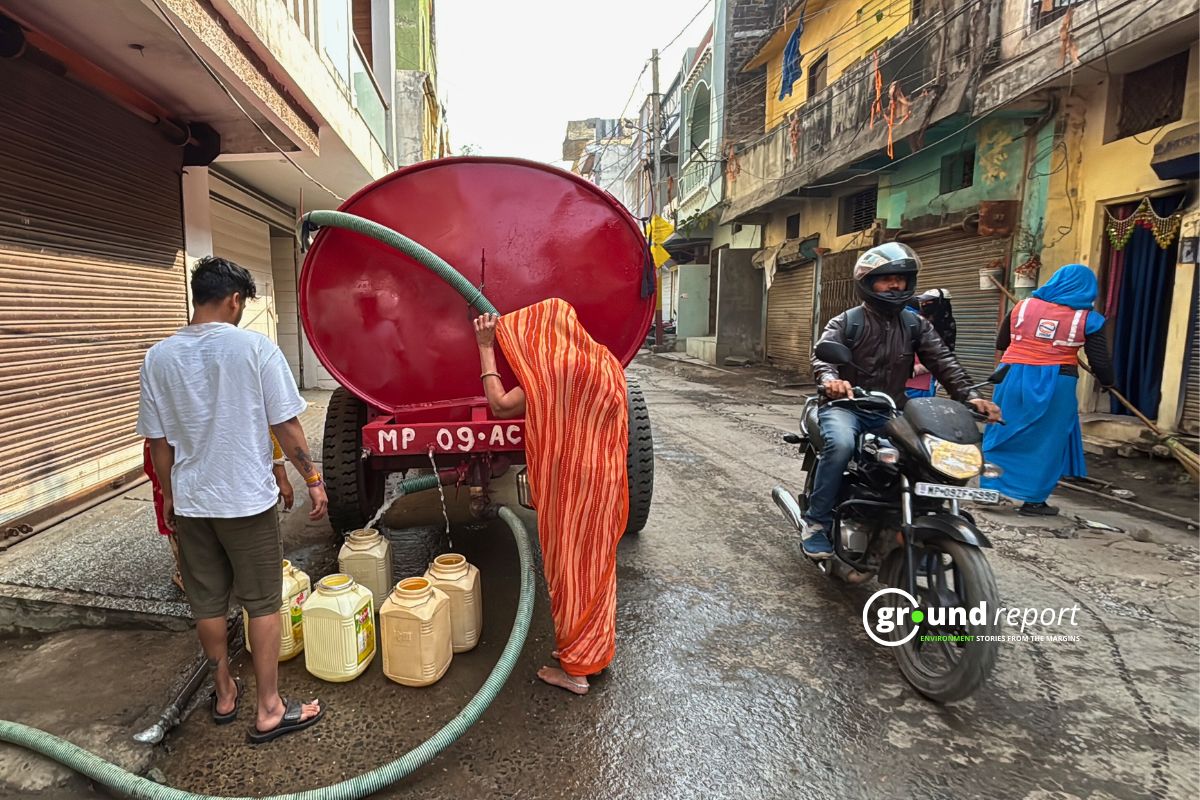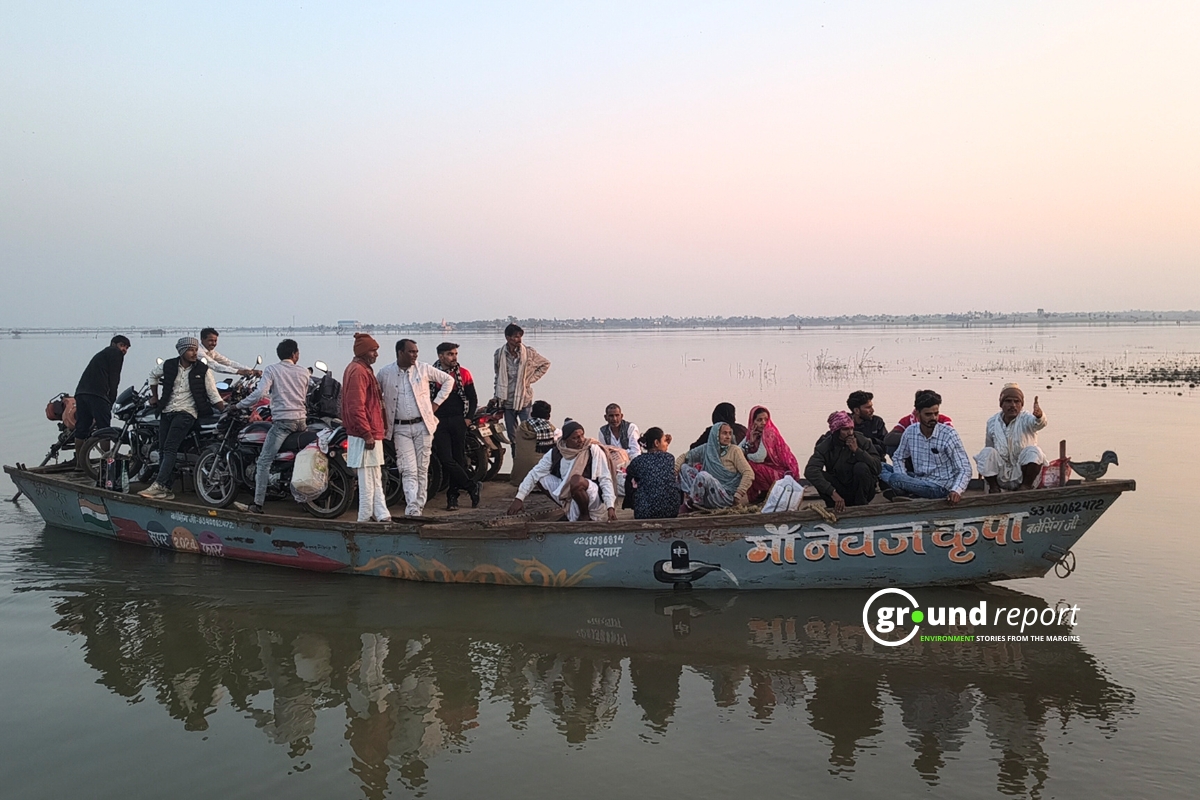Agriculture is vulnerable to climate change. Madhya Pradesh saw a 33% dip in wheat production in 2024 compared to 2023, the highest in India, according to the state agricultural department. It’s the only state where procurement decreased from 7.1 million metric tons (MT) in 2023 to 4.8 MT in 2024.
Climate change severely affects farmers in Madhya Pradesh, a central Indian state reliant on agriculture. As per the information on the Madhya Pradesh Climate Change Knowledge Portal website, agriculture supports nearly 70 per cent of the rural population. The region’s economy depends on farming, with about 72% of its land being rain-fed, making the state vulnerable to climate variations.
Rainfall and hailstorms damaged crops in MP
In February 2024, the state agriculture department assessed that rainfall and hailstorms significantly damaged crops in Madhya Pradesh. Wheat and chana crops in Malwa and Bundelkhand lost 20–30%, while 15% of mustard crops in Chambal and central regions were destroyed. The 15 affected districts include Niwari, Khandwa, Betul, Harda, Ratlam, Anuppur, Narmadapuram, Chhatarpur, Burhanpur, Gwalior, Satna, Tikamgarh, Chhindwara, Agar Malwa, and Dewas.
Similarly, In April 2023, sudden weather changes in Madhya Pradesh severely impacted farmers, as heavy rain and hailstorms caused significant crop damage which included wheat, gram, and pulses. Strong winds and hail destroyed wheat crops in districts like Bhopal, Sehore, Raisen, and Vidisha. Hailstorms damaged other crops in Mandsaur, Ratlam, Neemuch, Alirajpur, and Agar Malwa.
According to the Down to Earth report, in February the government revealed distressing numbers, with over 3,000 farmers across 34 tehsils reporting crop damage. Wheat fields suffered 20–50% damage, while pulses like gram and lentils were wiped out. Pea crops faced a similar fate, with many plants withering before blooming or bearing fruit. Farmers expressed their despair as the unfavourable weather reversed their efforts.
Surajbali Jat, a farmer from Chapadagrahan, Narmadapuram, described the difficult situation on his 35-acre farm. He said that he invested heavily in gram and wheat crops for the Rabi season, but late December and early January fog caused 50–70% losses. Jat planted gram on 11 acres, hoping for a good yield, but the cold and fog during the flowering stage, along with blight, destroyed 70% of the crop.
Climate shifts hurt MP’s wheat production
Climate shifts impact the state’s agriculture. Wheat production in Madhya Pradesh has declined for three years: from 371.98 lakh metric tons in 2019-2020 to 349.23 lakh metric tons in 2021-22. This decline extends beyond wheat. Farmers face erratic weather patterns complicating their schedules.
According to the state’s climate vulnerability report, Madhya Pradesh faces significant risks including increased temperatures, unpredictable monsoon patterns, more frequent and intense rainfall, reduced rainy days, prolonged summers, and a rise in droughts and floods.
Extreme weather events challenge agricultural practices in Madhya Pradesh. Farmers face productivity losses due to excessive rainfall and prolonged droughts, causing immediate crop damage and long-term soil fertility effects. The western state is prone to droughts due to uncertain rainfall, while the eastern region, despite high rainfall, suffers low rice productivity due to inadequate water management.
Rising temperatures threaten agriculture in the state. Research indicates that if temperatures rise by 4°C, yields of staple crops like rice and wheat could decline by 25–40%. This reduction affects farmers’ ability to sustain their families and contribute to the local economy, particularly for small-scale and tribal farmers lacking the resources and technology to adapt.
G.S. Kaushal, Former Director of Agriculture, Govt. of Madhya Pradesh, said, “We’ve discussed global warming and its effects since 2000, but the government hasn’t prepared farmers. Now, untimely rains during harvest are more frequent. The state government should focus on crop diversification and adjust the sowing season.”
Increased extreme weather events recently
-
- Frequent floods and droughts are causing productivity losses, making it hard for farmers to maintain stable outputs.
-
The western part faces droughts, while the eastern part has waterlogging issues.
-
Declining soil fertility and groundwater levels are worsening climate change impacts.
-
Black soils in the state suffer from poor drainage, causing waterlogging and reduced yields in soybeans and pulses during heavy rainfall.
-
Climate change is worsening poverty among farmers, especially in tribal areas, where fluctuating weather impacts food and income.
-
Many tribal farmers rely on traditional agricultural methods that lack resilience against climate impacts.
-
Limited access to resources and technology hinders adaptation efforts for small-scale and tribal farmers.
Over the past fifteen years, erratic rainfall has significantly reduced crop yields, with some dropping by up to 60%. Wheat production is expected to fall by 6-23% by 2050 due to rising temperatures, with durum wheat being particularly sensitive. Rice yields may decrease by 7% by 2050, with rainfed rice potentially dropping by 6%. Soybean yields might see a 9–12% increase due to more rainfall and higher CO2 levels, but unseasonal rain could cause losses. By 2030, Bengal Gram yields could rise by 24% with more rain and CO2, though high temperatures could reduce output.
The Madhya Pradesh government is exploring adaptation strategies, including developing heat-tolerant crop varieties, implementing conservation agriculture, improving water management, and adopting methods like System of Rice Intensification (SRI).
Support us to keep independent environmental journalism alive in India.
Keep Reading
MP farmers battle stray animals, sleepless nights to protect crops
Indore’s Pipliyahana Lake struggles to survive, even after conservation measures
Costliest water from Narmada is putting financial burden on Indore
Changing weather pattern impacts soybean crops in Dewas region of MP
Follow Ground Report on X, Instagram and Facebook for environmental and underreported stories from the margins. Give us feedback on our email id greport2018@gmail.com.
Don’t forget to Subscribe to our weekly newsletter, Join our community on WhatsApp, Follow our Youtube Channel for video stories.








